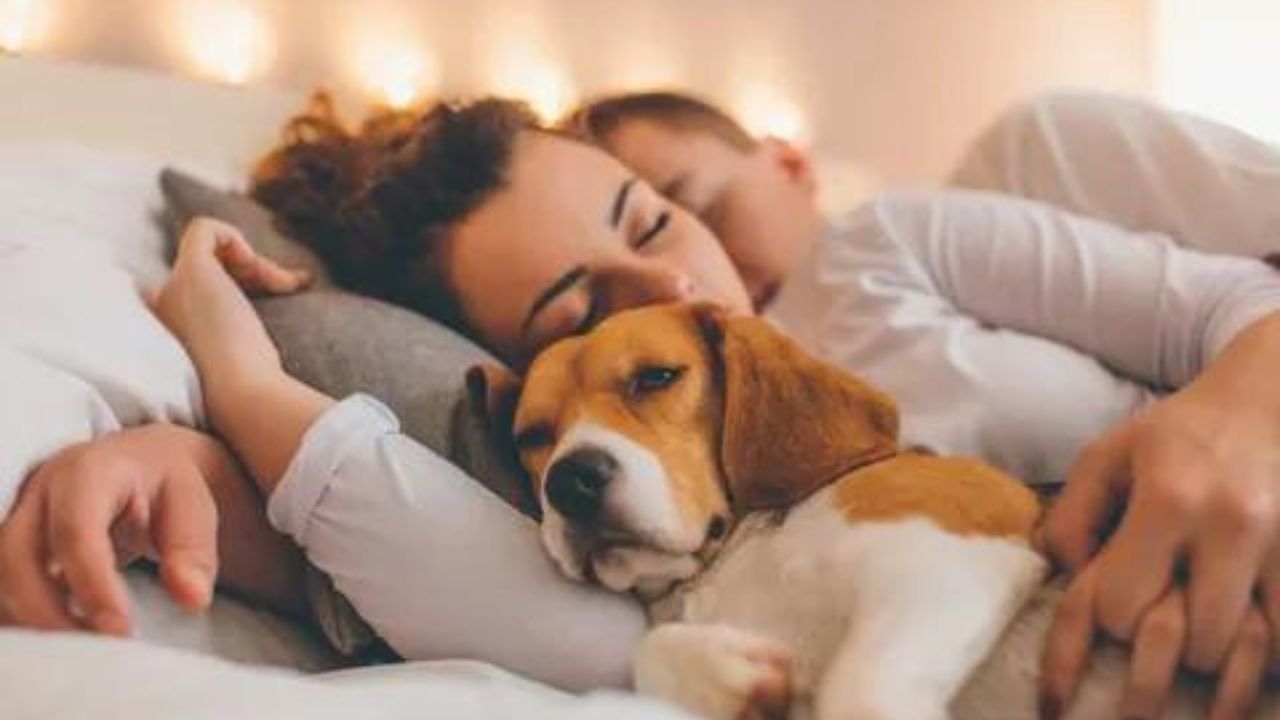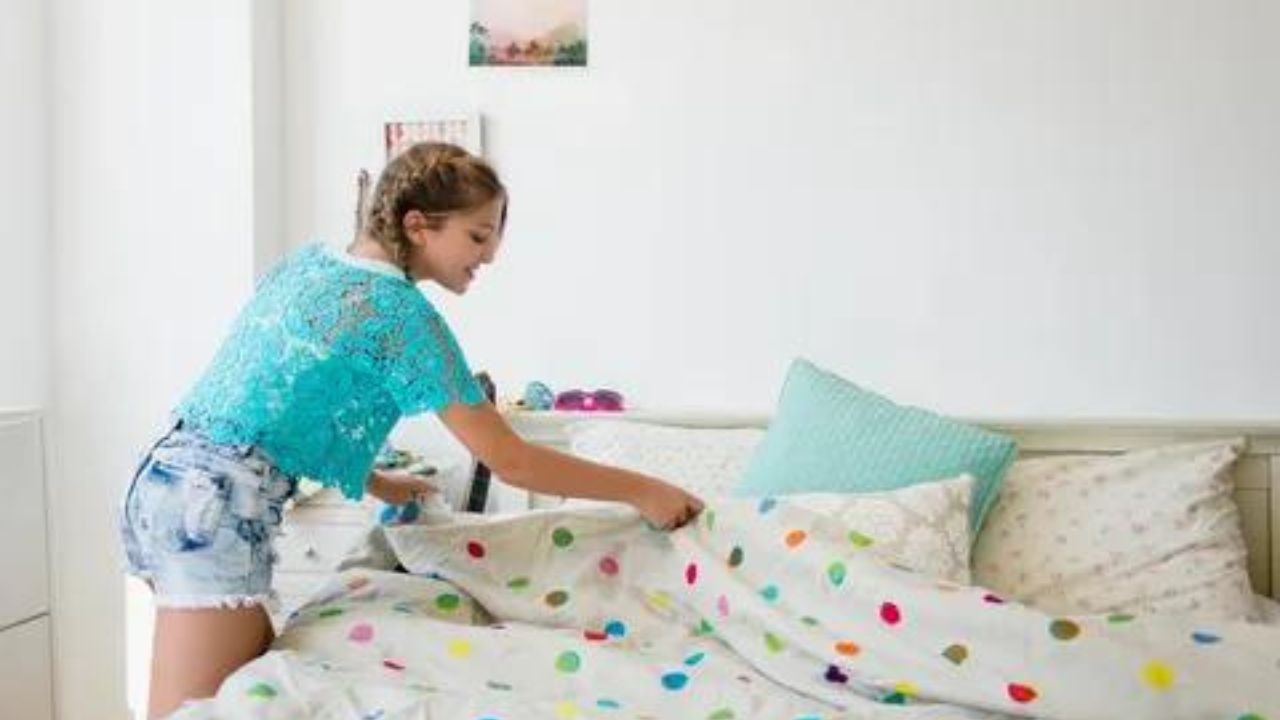Some puppies may be ready to sleep in Bed at 4 months old, but some may need to be 6 months old or older before sleeping with you. Only focus on the number and your dog’s readiness for this big step.
Bringing a new puppy into your home is an exciting time. As a pet owner, you want to provide your furry friend with the best care and comfort. One of the questions that often arises is, “When can a puppy sleep in your bed?” This article will explore different perspectives on this topic and guide when it might be appropriate for your PuppyPuppy to join you in Bed.
CAN MY DOG SLEEP IN MY BED WITH ME?

When Can a Puppy Sleep in Your Bed The short answer is yes if you want your dog to sleep in the Bed with you.
New dog owners first ask me how to stop their dogs from peeing in the house. Their next question is usually whether or not it is OK to have their new dog sleep in the Bed with them.
The answer is that yes, it is OK. However, there are some things to consider before inviting your pup to share the Bed, and there is a correct way to train your dog to be a desirable sleep partner.
It is best that you decide to have or not have your dog sleep in your Bed BEFORE the first night with your dog. If you have already committed one way, no worries. This article will help you as well.
Let’s review what to consider when deciding to have your dog sleep with you in your Bed and then the best way to train this behaviour.
If you have a puppy and hope that your PuppyPuppy will soon be sleeping with you, this article is a must-read!
The Importance of Safe Sleeping Arrangements
Before diving into the question of when a puppy can sleep in your Bed, it’s essential to understand the importance of safe sleeping arrangements. Like humans, dogs need a peaceful and comfortable resting place to sleep. Creating a designated sleeping area for your puppy can help establish a routine and ensure they get the quality sleep they need.
Wait until Your Dog Is Potty Trained
Ideally, your dog should be close to fully potty trained before you allow them to sleep in Bed with you. There are several reasons for this. First, you want your dog to avoid habitually getting your Bed as a potty pad. This can be hard to break, especially if it happens in the middle of the night and you do not catch it. Once your dog is old enough to alert you when they need to go to the bathroom, you don’t have to worry about finding unpleasant stains on your sheets in the morning.
The potty training phase teaches your dog to control their bladder and bowels. If you have a recently weaned puppy from their mother, you may have to take the dog out once or twice in the middle of the night to use the bathroom. Over time, your dog will require less frequent trips out, until they can eventually sleep with you all night without interruption. Until then, keeping your dog in a crate or other confinement while you work with them on using the potty outside is best.
Early Weeks: Fostering Independence
During the first few weeks of bringing a puppy home, it’s crucial to establish a routine and create a sense of independence for them. According to Purina UK, if you manage the first couple of weeks well, puppies can start sleeping through the night as early as 12 weeks old[^1^]. During this period, it’s generally recommended to have your PuppyPuppy sleep in their designated space, such as a crate or a dog bed nearby.
Think about Your Sleeping Habits
Are you a hard sleeper? Do you toss and turn a lot? Are you liable to roll over on your dog and not notice, or will you sleep in one position all night? Consider your sleeping habits when bringing your dog into Bed with you. If you’re a light sleeper, think about how much a twitching puppy might bother you throughout the night. Will you be able to get the rest you need, or would it be better for the two of you to sleep separately?
Factor in all of these circumstances before you let your PuppyPuppy sleep with you, and you will have a great experience no matter what.
Gradual Introduction to Your Bed

As your PuppyPuppy grows older and becomes more familiar with their surroundings, you may be tempted to introduce them to your Bed. However, it’s important to consider a few factors before making this decision.
Bonding and Security
Allowing your PuppyPuppy to sleep in your Bed can foster a stronger bond between you and your furry companion. Many pet owners find comfort in having their pets close during the night, as it can provide a sense of security and companionship. According to Kyle Kittleson, a dog behaviour expert, sleeping together can be a bonding experience for you and your Puppy Puppy [^2^].
Behavioural Considerations
While your PuppyPuppy sleeping in your Bed may sound appealing, it’s essential to be aware of potential behavioural implications. The Puppy Academy warns that allowing your pup in Bed at a young age can lead to more demanding and unwanted behaviours in the long run[^5^]. Some puppies may become overly dependent or exhibit separation anxiety if they are always allowed to sleep in their Bed. Setting boundaries and establishing consistent training routines is crucial to prevent potential issues.
Personal Preferences
Ultimately, the decision of whether to let your PuppyPuppy sleep in your Bed is a personal one. Different pet owners have varying preferences and lifestyles. Some may enjoy the closeness and warmth of their pets during the night, while others may prefer to maintain a separate sleeping area for their furry friends. It’s important to consider your comfort and the well-being of your PuppyPuppy when making this decision.
Expert Opinion
To further explore this topic, we contacted experts in the field to gather their insights on when a puppy can sleep in your Bed.
According to a thread on Reddit’s r/puppy101 community, it’s generally recommended to wait until your PuppyPuppy has a solid understanding of potty training before allowing them to sleep in your Bed [^3^]. This can vary from PuppyPuppy to PuppyPuppy but typically takes around four months.
Quora suggests that having your PuppyPuppy sleep in the same room as you, especially at a young age, can help them feel secure and reduce their anxiety[^4^]. Sharing the same space can give them a sense of safety and comfort, knowing their owner is nearby.
Size and Breed Considerations
The size and breed of your PuppyPuppy can play a role in determining whether they can sleep in your Bed. Smaller breeds are generally more manageable and less likely to disrupt your sleep. However, larger breeds may take up a significant amount of space and may need to be more suitable for sharing a bed. Consider the size of your Bed and the potential impact on your comfort before allowing your PuppyPuppy to join you.
Health and Allergies
If you or someone in your household has allergies or respiratory issues, it’s essential to carefully consider whether allowing a puppy in Bed is the best choice. Dogs can carry allergens such as dander, which may trigger allergic reactions in sensitive individuals. Consult with your doctor or allergist to determine if sharing a bed with your PuppyPuppy is viable.
Sleep Disturbances
Puppies are known for their energy and playfulness, especially during the early stages of development. Having a puppy in your Bed may result in sleep disturbances, such as pawing, scratching, or even accidents. It’s crucial to be prepared for these potential disruptions and ensure you can still get a good night’s sleep while accommodating your PuppyPuppy.
Training and Boundaries
Allowing a puppy in your Bed requires consistent training and the establishment of clear boundaries. It’s important to teach your PuppyPuppy appropriate behaviours and reinforce positive habits. For example, you may want to implement a “no jumping on the bed” rule or use a designated cue to let your PuppyPuppy know when it’s OK to join you. Consistency and positive reinforcement ensure that your PuppyPuppy understands the rules and respects your sleeping space.
Alternative Sleeping Arrangements
If you decide that having your PuppyPuppy sleep in your Bed isn’t ideal, alternative sleeping arrangements exist. Some pet owners choose to have a crate or a dog bed in their bedroom, allowing the PuppyPuppy to sleep nearby without being in the actual Bed. This can provide a sense of security and companionship while still maintaining separate sleeping spaces.
Gradual Transition
Consider a gradual transition if you’re unsure whether your PuppyPuppy is ready to sleep in your Bed. Start by allowing your PuppyPuppy on the Bed for short periods during the day for cuddling or bonding sessions. Monitor their behaviour and observe how they respond to being on the Bed. If all goes well, you can gradually increase the time and eventually allow them to sleep with you if it feels right for both of you.
Conclusion
Bringing home a new puppy is an exciting and joyous experience. When it comes to the question of when a puppy can sleep in your Bed, there are several factors to consider. It’s important to prioritize the safety and well-being of your PuppyPuppy by providing them with a designated sleeping space during the early weeks. As they grow older and more independent, you can gradually introduce the idea of sleeping in your Bed if it aligns with your personal preferences and lifestyle.
FAQ
Why can’t PuppyPuppy Sleep in Bed?
Allowing your pup in the Bed with you at a young age can be a gateway to them exhibiting more demanding and unwanted behaviours. If you’re noticing more barking, jumping, nipping and generally not listening, it is common for this to all stem from the lack of boundaries and structure, especially at nighttime.
Where Should My Puppy Sleep at Night?
It’s best to make them a comfy nest they can call their own, where they can be snug at puppy bedtime. If you’re using a puppy crate, a cosy bed can be put inside, with layers of newspaper underneath to soak up any spilt water or wee accidents.
Is it OK to Let your Dog Sleep in your Bed?
If you roll over in Bed and startle your pet, he may not intend to bite, but an unintentional bite hurts as much as an intentional one. But, co-sleeping should be fine if you and your dog do not have health or behavioural issues that would make sleeping together an unhealthy situation for either party.
Should I Let my Puppy Cry it Out?
It’s a common mistake some owners make to leave their PuppyPuppy in their Bed or crate to ‘cry it out’. Even if they seem to settle down, this could have the opposite effect to what you want and make them more anxious to be alone, causing them more stress.

